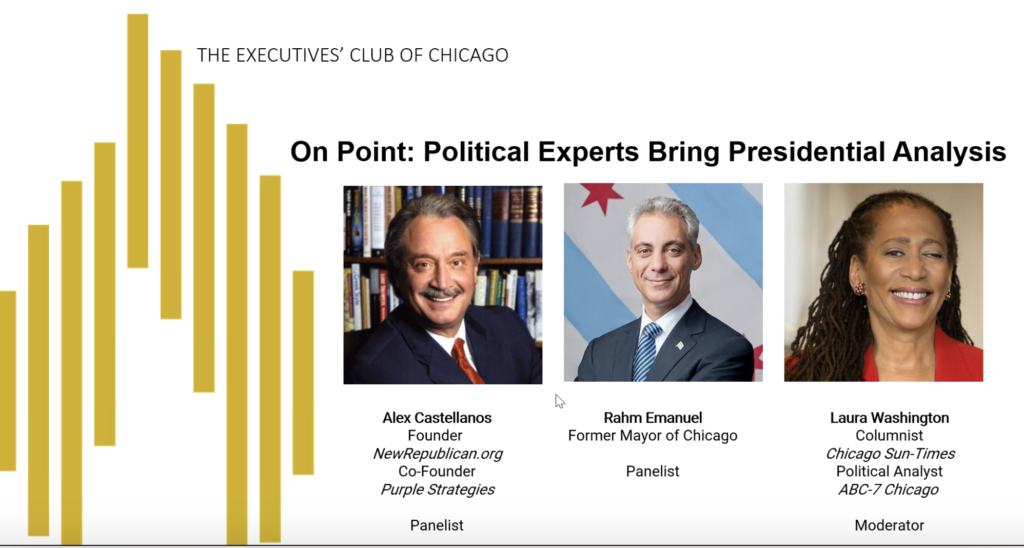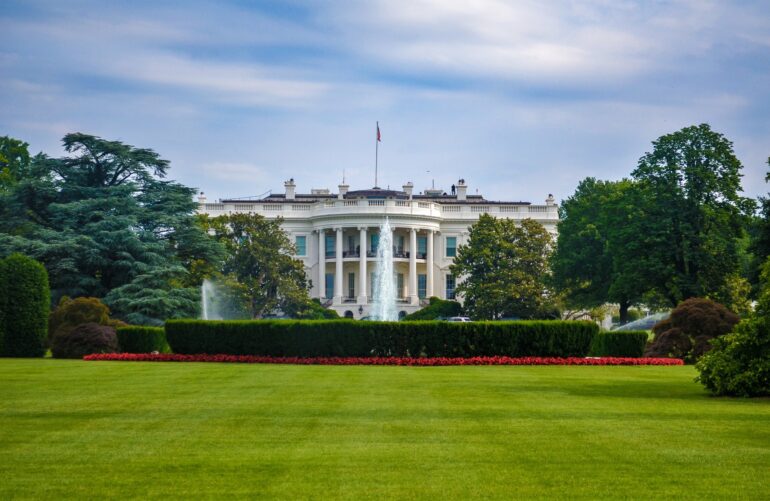On Wednesday, Oct. 21, the Executives’ Club of Chicago hosted former Chicago Mayor Rahm Emanuel and republican political consultant, Alex Castellanos, in conversation with the Sun-Times’ Laura Washington.
With just two weeks until one of the most contentious elections in recent memory, panelists were pressed to discuss Nov. 3 — and what may follow.

Here are some of key takeaways from their conversation to bring (or avoid bringing) to the dinner table:
1. Who is going to win the election?
“It’s all about Donald Trump. You’re either voting for or against Donald Trump.” – Castellanos
“At the end of the day, the race is Trump versus Trump, and he’s still losing that race.” – Emanuel
While both Emanuel and Castellanos agreed that Democratic candidate Joe Biden seems positioned to win the election based on recent polls, they cautioned that there is always the possibility of upset.
There is a margin of error within polling, and that can be misleading. Castellanos said that with polls so far being comprised of participation amongst a higher educated demographic, Trump’s base may be discounted. He added that there is an embarrassment factor amongst some Trump voters, too. Perhaps, more so than in 2016 because of Covid-19. Some Trump voters will not publicly acknowledge that they are voting for him, but will in the polling booth. He also said that states like Florida, North Carolina and Michigan have the potential to surprise voters.
Emanuel cautioned that polling is still inconclusive when deciphering how the Black and Hispanic vote will fall — huge factors in this upcoming election.
Another consideration is, historically, defeating an incumbent is quite difficult. In the last 100 years of the presidency, it has only happened four times.
2. What about battleground states?
Paying attention to what happens in battleground states is especially important this year. According to Castellanos, many states in the rust belt, like Missouri, have become increasingly red. He also noted that as Pennsylvania’s demographic has changed, making it less suburban, it, too, has become more red.
Emanuel said these battleground states will be paramount in determining a path, or lack thereof, to the presidency on election night. According to Emanuel, if key states like Georgia go blue, then it will be understood that Trump has no clear path to the presidency. He said that Americans may not have a definitive result on Nov. 3, but based on how these battleground states play out, a presumptive president will be clear.
3. Should we worry about Trump’s potential resistance to a peaceful transfer of power?
“I really don’t think that a transition of power will be an issue,” Castellanos said. “I think everyone on both sides understands that in these moments, the good of the country comes first.”
What is more concerning to Castellanos is that Trump may have cost himself the election by telling his base not to vote. By condemning the legitimacy of mail-in voting, Trump discouraged voter participation amongst his supporters. And, it worked. Trump’s base did not show up for early voting. According to Castellanos, he needs to produce a massive voter turnout on election day.
4. How important is the final presidential debate on Oct. 22? What do the candidates need to do to win?
Emanuel said that for the final debate, the burden is entirely on Trump. Biden’s debate strategy is clear, and it works. His appeal to the average American through sincerity, decency and direct eye contact was effective in the first debate, and ultimately pegged him as the winner. Trump’s interruptions of both Biden and moderator Chris Wallace were damaging to his performance, and Emanuel said that in the upcoming debate he needs a “home-run.”
“I think [Trump] should thank the moderators for the mute button,” Castellanos said. “That’s a gift for him.” And while Castellanos noted that for most of Trump’s base, predatory politics works, it is not an effective strategy for those who may be undecided.
5. Where does Barack Obama fit into this? Does his support on Biden’s campaign trail make a difference?
“I’ve always said that listening to Barack Obama speak is a lot like sex,” Castellanos said. “The worst you’ve ever had is still excellent.” That is to say that, yes, Obama’s support does make a difference in Biden’s campaign.
Castellanos also said that he thinks Obama’s delay in participation was helpful in public perception of Biden as being a serious presidential candidate, and not just Obama’s Vice President. Obama’s campaigning will also perceivably increase voter turnout amongst Black Americans and suburban voters.
While agreeing with Castellanos, Emanuel added that the narrative voters associate with Obama should not be underestimated. Americans appreciate Obama’s personal decency, but also the decency associated with the Oval Office under his administration.
“It feels like [the Obama administration] was almost another era,” Emanuel said. “And, Americans want that sense of normalcy again.”
“The last time the country was truly united was in those brief moments right after Obama was elected to his first term,” Castellanos added.
6. How have civil unrest, protests and racial justice impacted this campaign? How will these recent events affect the turnout amongst Black voters?
“At first, the country was united, because everyone witnessed a murder,” Castellanos said. “But then, the movement seemed to get hijacked. It turned to violence and looting, it turned into something else.” He said that this shift fueled polarization.
Castellanos also said that this summer’s unrest helped Trump amongst Hispanic and Latino voters. For many working-class, Latino voters who are trying to make a livable wage in America, violence and looting was detrimental. Castellanos said while many privileged Americans could protest and then return to safe communities, that was not the case for some marginalized groups whose businesses were collateral damage.
However, Emanuel had a different takeaway.
“Biden went to Kenosha right after Trump did,” he said. “One looked like the President trying to solve a problem, the other looked like the problem.”
He explained that Biden’s decency and authenticity are seen as antidotes to Trump’s tendency to exacerbate or inflame problems. Emanuel also said that we are seeing a higher turnout of young voters, specifically young voters of color at the polls.
7. Who are Emanuel and Castellanos voting for, and how are they voting?
“I voted for Biden on day one of in-person voting,” Emanuel said.
“I’m currently a Floridian, and my wife and I are doing mail-in ballots– despite what my President said. We’re going to help Donald Trump carry the great state of Florida,” Castellanos said.
“I voted during the Bears game, so there was no line!” moderator Laura Washington added.
More from Better:
- 10 Must-Try Chicago Restaurants That Have Opened in 2020
- Trick-or-Treating, Costumes, and More: Tips for Celebrating Halloween Safely in 2020
- Moral Courage in Challenging Times: The James W. Foley Legacy Foundation Freedom Awards Gala

Madison Muller is the Assistant Digital Editor at Better. A recent graduate of Northwestern’s Medill School of Journalism, she approaches our contemporary media environment with compassion and candor. She is interested in writing about the intersectionality of social justice issues in marginalized communities and environmentalism. Madison proudly supports Action Now, a community organization that empowers and uplifts residents on Chicago’s West Side.
She also encourages reading and supporting The Marshall Project, a non-profit news organization that seeks to create and sustain a sense of national urgency about the U.S. criminal justice system.
You can keep up with her reporting on Twitter and Instagram.

